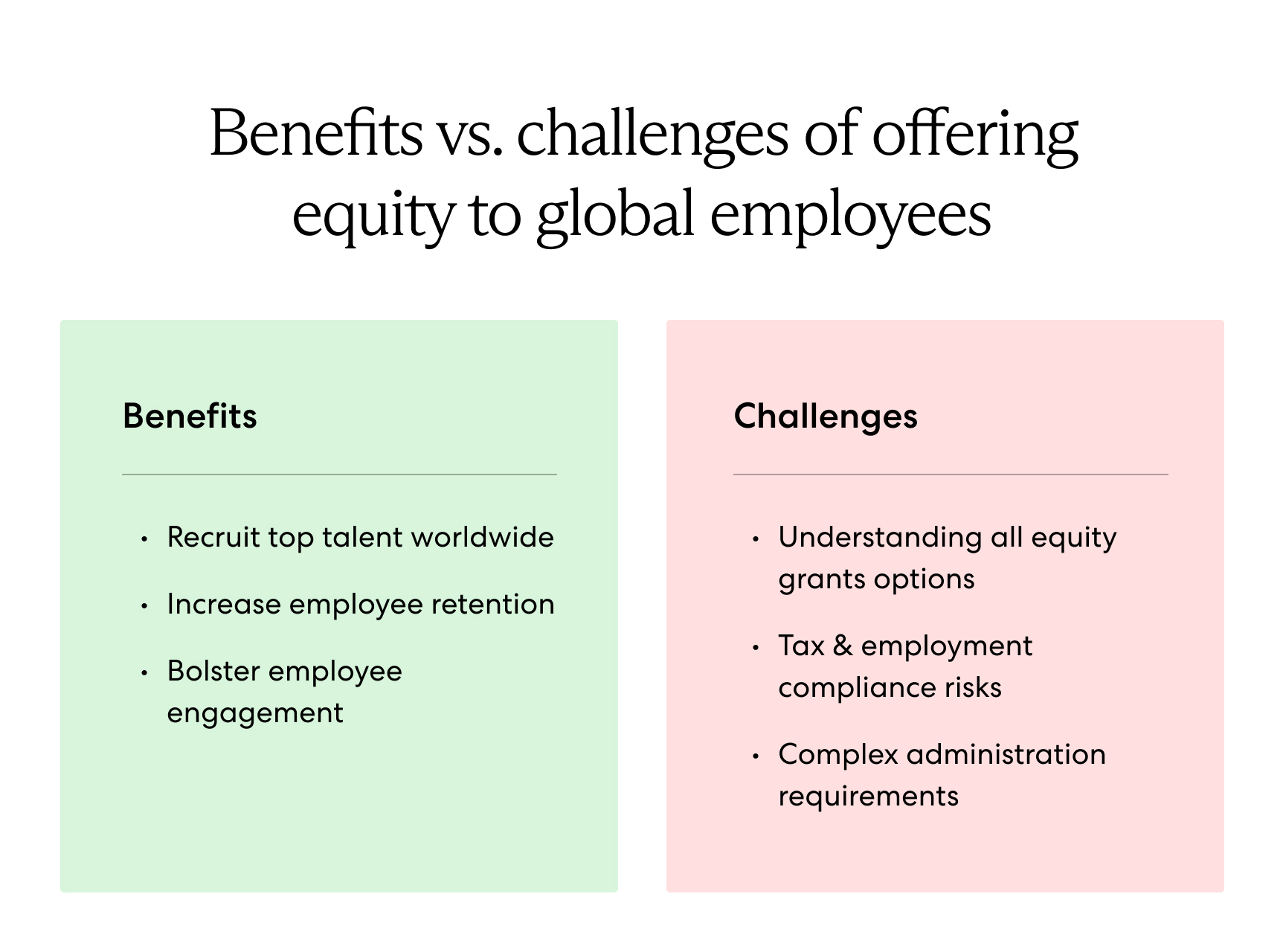One of the best ways employers can attract and retain talent worldwide is by offering equity compensation. By granting a small percentage of company ownership, employers set themselves apart from the competition, boost employee engagement, and reduce employee churn.
As companies expand globally, many employers face challenges with granting stock options and other equity awards to foreign employees. Employers must familiarize themselves with available equity options and comply with country-specific tax and employment laws.
Read our guide to learn key considerations for granting stock options and other equity awards to foreign employees—including how to avoid the risks of noncompliance.
What are equity awards?
Equity awards refer to a range of equity compensation (either share-based or cash-settled), such as Nonqualified Stock Options (NSO), Restricted Stock Awards (RSA), Restricted Stock Units (RSU), and Phantom Units. Each vehicle works differently and either grants employees company ownership or rewards them in line with the company valuation.
Consider the following statistic:
Source: The State of Equity Plan Management 2022 Report
7 common forms of equity compensation
Many employers offer different forms of equity as direct compensation to their employees. Below are the seven most common equity compensation forms.
Restricted stock awards (RSAs)
RSAs are a type of equity award that grants employees company stock but with some restrictions. Employees cannot sell them until the shares vest, usually following a specified vesting schedule or liquidation event.
Restricted stock units (RSUs)
RSUs are a promise that an employee will receive common company stock based on certain vesting conditions—usually the passing of a specified time period (or vesting period). RSUs typically do not include shareholder rights, nor do they pay dividends. Employees rarely have to pay for RSUs and do not own the shares until the vesting period lapses.
Phantom units
Phantom units give employees many of the same benefits as stock ownership without actually granting them company stock. Phantom units, otherwise known as shadow equity, follow the company stock’s actual price movements and pays out cash in place of shares.
Incentive stock options (ISOs)
ISOs are statutory stock options available to employees in the United States and provide specific tax benefits to employees of U.S. companies. ISOs are considered qualified awards, which means U.S. employees pay no tax when they receive the grant option nor when they exercise the grant. They only pay capital gains tax when they sell the stock. Additionally, ISOs typically require a direct relationship between the issuer and the participant.
Nonqualified stock options (NSOs)
NSOs give employees the right to purchase company stock at a predetermined price. NSOs usually substitute some of the cash compensation employees earn from their employment. Employees must pay income tax on the difference between the options price and the stock value at the time they exercise the options.
Read also: Stock Options vs. Stock Grants
Stock appreciation rights (SARs)
SARs are a form of compensation linked to the value of the company stock over a specific time period. After the vesting period, employees can exercise their SARs. However, employees do not pay the exercise price. They receive the sum of the increase in the stock value in a cash payment or shares.
Performance share units (PSUs)
PSUs are shares that employers grant to employees based on company performance. The number of shares an employee receives depends on key company performance metrics over a specific time period. PSU awards can also be graded, with multiple vesting points relative to the company’s overall performance.
Benefits of offering equity to foreign employees
Granting stock options and other equity awards to foreign employees benefits you and your distributed workforce in many ways. An equity incentive plan can help you attract and retain top talent worldwide, increase employee retention, and boost employee engagement.
Recruit top talent around the world
Many companies aren’t familiar with how to grant equity awards to foreign employees and, therefore, don’t offer these benefits. By including equity awards in your global employee benefits package, your company stands out as an attractive landing spot for top candidates. Company ownership also helps employees feel like they are a part of your team.
Increase employee retention
Since the vesting schedule is often linked to an employee’s time with the company, granting equity awards can incentivize employees to stay with the company and help it develop over time.
Bolster employee engagement
In many cases, the better the company performs during the vesting period, the greater the bonus for the employee when a distribution event occurs (typically at exercise for stock options and at vest for RSUs/PSUs). If an award’s vesting terms are directly linked to company performance, then employees are more collaborative and committed in the long run.
Challenges of offering equity to foreign employees
Companies that grant equity awards to foreign employees also face many challenges. They must familiarize themselves with the range of available equity options, comply with foreign tax and employment laws, and learn how to offer equity awards globally.
Understanding all equity compensation options
Each available equity award has different implications for your business and your talent. Determining the best ones for your company is a time-consuming process and depends on several factors, such as your specific goals, company size, and company structure:
- Is your stock price already unaffordable for your employees? RSU offerings are worth considering, as they allow your employees to attain shares without paying an exercise price.
- Do you plan to offer equity to contractors? Many companies issue NSOs or RSUs as non-employee grants to contractors since these issuance types are not restricted to employees.
Tax and employment compliance risks
Employers interested in offering equity to employees worldwide must also have a firm grasp of the local tax and employment laws of the employee’s country of residence. Employers must consider several key factors:
- Tax obligations vary worldwide. Some countries impose tax withholding and reporting when the employer grants an equity award, while others don’t impose withholding and reporting until the shares vest/exercise.
- Equity compensation can impact worker classification. Offering equity to a contractor establishes a more direct relationship with that worker, which may influence their worker classification. Employers should weigh the benefits of granting equity to contractors against the risk of misclassification.
It’s equally important to communicate equity-based tax filing and reporting requirements to your employees. Helping your employees stay safe and compliant ensures your equity plan remains an incentive.
Complex administration requirements
Before offering equity to employees, you must be prepared to compliantly and effectively administer your equity plan globally, which requires navigating several key steps:
- Determine your company valuation. If your company is not publicly traded, you’ll need to establish the fair market value (FMV) of your company’s shares.
- Prepare an equity plan. Determine what types of equity you will offer as part of your compensation policy and their global tax implications.
- Register your plan with federal authorities. Familiarize yourself with local registration requirements and exemptions.
- Establish payroll processing and reporting. Set up global payroll processing and reporting that complies with the tax laws of each country in which you offer equity awards.
Administering equity compensation as part of a global total rewards package is a complex process that poses compliance risks for companies that go it alone. Employers who don’t work with a trusted partner risk hefty noncompliance penalties, such as fines and tax arrears.
The easiest way to offer equity to your global team
Granting equity awards to foreign employees gives you a competitive edge over other companies competing for the best talent worldwide. However, navigating tax laws and employment legislation in multiple countries on your own is overwhelming and extremely risky. You can eliminate these risks by working with an experienced partner like Velocity Global.
Our Global Equity Program makes it easy to grant comprehensive equity packages to your distributed workforce. We partner with leading tax advisory firms to help offer compliant, locally tailored equity awards worldwide. We handle everything from plan registration, payroll processing, annual reporting, and coordinating withholding rates so you can focus on building your global team.
Get in touch with Velocity Global today to learn how to confidently and compliantly grant equity awards to foreign employees.
Equity compensation FAQs
Below are answers to commonly asked questions about granting equity awards to foreign employees.
Can you grant ISOs to foreign employees?
In some cases, yes. If an employee works for a qualifying U.S. company, they can receive ISOs. However, depending on the tax legislation of the country where the foreign employee resides, they may not receive the tax benefits that U.S. employees receive with ISOs. In this case, NSOs are often a better option for foreign employees.
Additionally, ISOs are considered qualified awards, which means they typically require a direct relationship between the issuer and the participant.
Who is not eligible for employee stock options?
In many countries, most employees are eligible for employee stock options. However, in some countries, certain employees are excluded from this right, such as company promotors or directors who hold more than a specific percentage of the company’s outstanding equity shares.
How are stock options granted to employees?
Employers grant stock options to employees through equity compensation plans. These plans are usually part of an employee benefits package. Stock options come in the form of regular call options that grant employees the right to buy shares at a certain price for a specific time period.
Learn more about how to compliantly issue equity across your global workforce when you partner with Velocity Global.
Topic:
Employee Benefits





